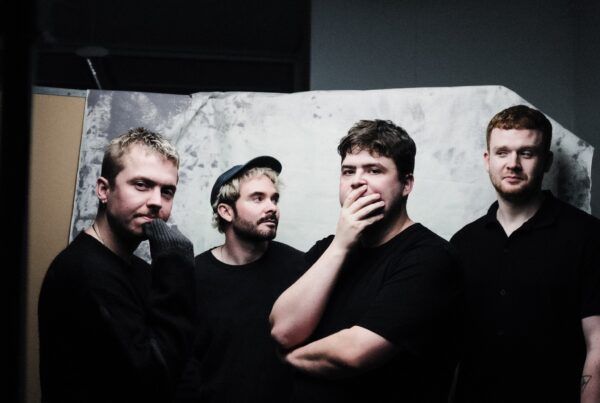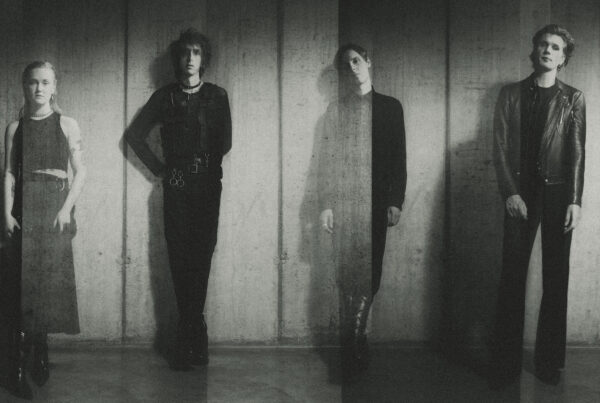After the release of Spirit of Rebellion in early January, we venture into the protean catacombs of Mortiis, catching up with the man behind the mask to explore what it’s like, and what it’s been like, at the cutting edge of dungeon synth.
The band has gone through several iterations since 1993, with phases in industrial rock, black metal and dark ambient, but while drummers and guitarists come and go, the one constant has been Håvard Ellefsen – aka Mortiis. Having led such a prolific career – touring the world and releasing countless records and remixes – we ask him how his attitude toward success has changed over time.
In the early days, he says, it was all about notoriety and maximising record sales. To spread his music far and wide, and get ‘’as much of everything as possible’’. Over the years however, he came to realise that Mortiis was too ‘’rooted in darkness’’ to ever become a household name. Nowadays, he’s happy to hold onto his rights, get positive feedback from fans and make a bit of money. It might not be enough to quit his day job, but for Ellefsen, still performing, having never giving up, is a success in itself.
In 2020 Mortiis is proud to be an independent, do-it-yourself artist. He tours as a solo act, owns his own work, and despite selling fewer records than he once did, ends up making more cash overall. In doing so he’s gained a fresh perspective on how things could have been in the past, if not for unfavourable record deals. Unsurprisingly, this experience has left him somewhat bitter toward the music industry, but grateful for where he is today.
Having achieved so much, we can’t help but wonder – what’s next? Ellefsen tells us that he has plenty of ideas to pursue, and has no intention of retiring any time soon! He’s currently on tour in the USA, but intends to expand the live show by enhancing the stage design with additional visuals and props, having been working on a number of projects in his garage. He also mentions that he’s toying with the idea of adding new members – maybe a fresh percussionist, or a female vocalist.
In a similar vein, we ask how solo tours compare with the full band experience, in particular regard to the things people don’t see. Ellefsen describes how it can be stressful to do everything yourself, and that you become more reliant on local techs, which can be frustrating if they don’t know what they’re doing. But ultimately you’re sailing your own ship and largely self-reliant, which sounds like an enviable position for an artist to be in.
It’s a different story when you tour as a group, however. Ellefsen describes how when you’ve been performing with the same people for several years, you each settle into your roles, and divergent opinions can develop. Everyone has their own ideas, and over time, as each member develops a sense of ownership based on their contribution, they want to see their own vision realised. If those visions conflict, then minor disagreements can gradually escalate, potentially leading to creative dismemberment. It’s human nature, and to some extent unavoidable, admits Mortiis, but someone needs to have the final word. Otherwise you end up wasting time, and the rot will set in.
‘’I don’t believe in democracy in bands’’
Nevertheless, Ellefsen emphasises how much fun you can have with a crew of like-minded musicians, especially in the early days when you often have to fend for yourselves. It’s hardly the glitz and glamour lifestyle some people imagine, which only ‘’lasts for like a second’’, but you do end up in all sorts of crazy low budget situations. These war stories forge strong bonds – a Three Musketeers camaraderie – but at the same time, living, working and creating in such close proximity can easily produce tension. It’s a fine balancing act.
For an artist whose brand eclipses the band, we had to ask where Ellefsen gets his ideas. Rather than specific sources, Mortiis adopts a broad focus, running with whatever ‘’pops up in my head’’. He describes how he might come across a creepy photograph, or some atmospheric theatre design, which gets him thinking about his own image. He’ll then put his own spin on it, and incorporate it into the Mortiis universe.
‘’I’ll never do something that is superficial’’
Sometimes inspiration strikes quite unexpectedly, he says. You might be playing around with some samples, and then something suddenly clicks into place. A ‘’happy accident’’, as he calls it. In order to capture those moments, you have to always be observant, and cultivate a hawkeye focus. Otherwise, valuable details can slip away in a second.
And what about the iconic mask? Early on it was a form of escapism, allowing Ellefsen to embody an identity beyond himself while simultaneously giving the music a face. Although, as any fan will know, Mortiis has often performed unmasked, such as during the band’s second era, when The Smell of Rain was released was in 2001. In this album, the otherworldly persona didn’t match the introspective tone and emotional turmoil which Ellefsen laid bare. It might not have pleased every fan, but whether Mortiis has adopted a mask or not has always reflected the artist’s creative intent.
It can be hard to wrap your head around how he finds time for it all, what with having children and a day job. But for Mortiis, it’s simple:
‘’Every time you have a window of time where something can be done – keep pushing’’
For Ellefsen this often takes the form of whipping out his smartphone, and marketing himself relentlessly; always trying to expand his audience, and get inside people’s heads. He also mentions that he’s a big list maker; constantly getting after his goals, responding to and chasing up opportunities. It’s clear he has a tenacious work ethic: always proactive, never reactive.
Before Mortiis heads off to his kid’s music recital, we fire one last question at him: what advice would you give to young musicians today, trying to make a dent in the industrial rock scene? It might be cliché, he acknowledges, but his first thought is: ‘’don’t give up’’. He goes onto explain that it takes time to learn the tricks of the trade and scope out your own style, but that equipment wise, you really don’t need much. Even so, ‘’It’s easy to feel like you disappear’’, so it’d help if you can get support and advice from someone more experienced. Although this isn’t a prerequisite for success, as Ellefsen didn’t have anyone to show him the ropes.
‘’Don’t be discouraged if people make fun of you’’
In particular Mortiis mentions how he was ridiculed when he was finding his feet, because his approach was so unconventional. It’s largely a mental struggle, he says. You have to endure the criticism, and use the positivity that emerges from your fanbase to fuel your crusade. But most of all, stay realistic. ‘’Don’t expect the world after your first song’’, he says, ‘’but if you keep at it, that stuff will happen’’.
Words: Alasdair Glen / Audio: Dom Smith






